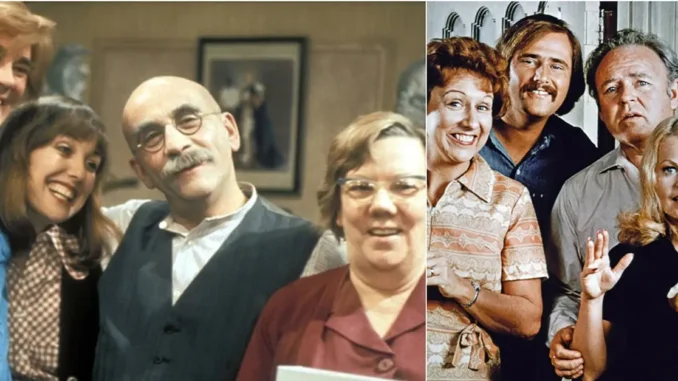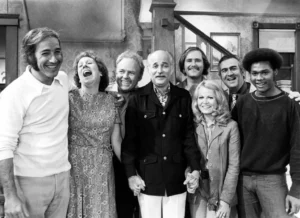
When you watch All in the Family, you may notice the credits that read the show was based on the series Till Death Us Do Part, which was a British sitcom that ran from 1965 to 1975 and was every bit as controversial in its run as the American counterpart was.
To get a sense of Till Death — and how closely Carroll O’Connor‘s Archie Bunker resembles Warren Mitchell’s Alf Garnett — turn to a 1968 edition of the Chicago Tribune: “The plot revolves around the four members of the Garnett family. Most of the action took place in their dumpy, working-class English house. Ruling over the household with bull arrogance was Alf, a bald, squinty-eyed Cockney whose arguments grew coarser and lousier as his facts became wilder. Mrs. Garnett, meanwhile, emerged from a stupor only to exult over her husband’s misfortunes. Their mini-skirted daughter exists only in a sort of mindless sexuality. Paired for fighting with Alf, usually in a battle of political catch-phrases, was his son-in-law, Mike. His main character trait was a cocky, with-it superiority. In this family completely devoid of love, any casual remark could set off the most hateful arguments, where victory was to be achieved by crushing personal insult.”
‘All in the Family’ vs. ‘Till Death’
Admittedly there are some differences, but as you can see, the Garnetts and the Bunkers have much more in common than they don’t. And like All in the Family would prove to be here, Till Death Us Do Part was shocking to its audience … and enormously popular. Like Archie Bunker, Alf Garnett was unlike anyone else who had ever been on television.

“Every Monday night, this Everyslob outrages his television audience,” reviewed the Fort Worth Star-Telegram in 1967. “Before anyone gets his dander up, it should be pointed out that this ‘comedy’ is not on American television” — excuse us as we offer a loud, Hah! — “The appeal of an Alf Garnett can be gauged by the reaction of an American writer who said, ‘Garnett, a slob in the shop steward mold, is the counterpart of the chap in the New Yorker cartoons, who sits about the parlor in his undershirt and fat, but swallowing beer from cans and wallowing in TV. But to hear Alf spouting his four-letter words, knowing that he is shocking the leaves off the tea set, is to love him.’”
Added Milton Shuman, TV critic for London’s Evening Standard, “The image may have been distorted, but in watching Till Death Us Do Part, Englishmen were looking at themselves wallowing in the hates and fears and prejudices most of us tucked away in some genteel niche of our psyche.”
Added Milton Shuman, TV critic for London’s Evening Standard, “The image may have been distorted, but in watching Till Death Us Do Part, Englishmen were looking at themselves wallowing in the hates and fears and prejudices most of us tucked away in some genteel niche of our psyche.”
By 1968, Till Death caught the attention of Norman Lear and Bud Yorkin, who attempted to create a pair of American pilots based on the show for ABC, but in the end, the network decided not to go forward with either one. In response, the duo decided that Lear would produce and Yorkin would direct a movie version. The Garnetts will become the Bunkers and the locale will move from Britain to Brooklyn, New York. The Ottawa Journal said the film would be “underscoring the generation gap involving a bigoted mother and father and their two liberal children.”
Of the original version, Lear said, “Just about every subject in the book, including sex, race and religion, was treated with frankness rarely seen on the tube.”
At least until January 1971, when CBS, who had convinced Lear and Yorkin that TV was the way to go, aired the first episode of All in the Family … based on Till Death Us Do Part. You know the rest.